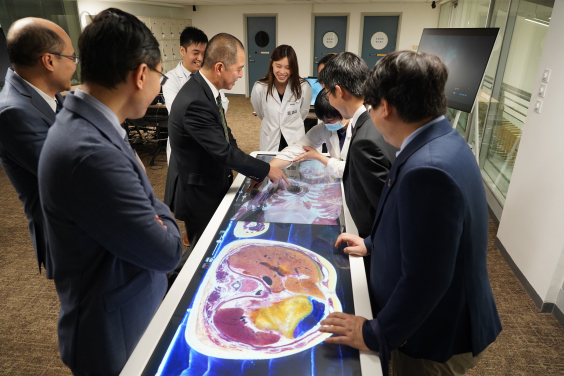Media
HKUMed receives HK$30 million from Mr Li Ka-shing
to ramp up the use of AI in teaching and learning
26 Sep 2023

Techmezz at Yu Chun Keung Medical Library is equipped with cutting-edge augmented reality (AR) facilities, such as Anatomage, a fully segmented real human 3D dissection platform for the exploration and learning of human anatomy in innovative ways.

Telehealth, which involves the use of telecommunications technologies in medical practices, such as tele-consultation for outpatients and tele-pharmacy, is widely practised in MBBS clinical teaching.

Students are engaged in exercises, using an App developed by HKUMed and their own smartphones to detect and differentiate patients’ chest x-rays with and without pneumonia, such that they could better understand the principles of data labelling and machine learning.

Ultrasonography is incorporated in MBBS teaching to acquaint all MBBS students with the application of the point-of-care ultrasound (POCUS) device, known to many as ‘tomorrow’s stethoscope’.
- 1 / 4
- 2 / 4
- 3 / 4
- 4 / 4
On a mission to nurture outstanding healthcare professionals for the future, it has been a longstanding ethos at the LKS Faculty of Medicine, the University of Hong Kong (HKUMed) to embrace technology-assisted teaching and training, and promote the integration of technological and pedagogical innovations into its professional curricula for the continued enhancement of teaching and learning capacity.
For the better part of the last decade, the Faculty has assembled its own multimedia production team to develop its in-house interactive online teaching material. Opened in 2022, the simulation wards at the Academic Building at 3 Sassoon Road equipped with high-fidelity simulators have effectively advanced not only undergraduate nursing education, but also interprofessional education for institutions in Hong Kong and beyond, which has earned for HKUMed the accolade ‘Teaching and Learning Strategy of the Year’ at THE Awards Asia 2023 for achieving system-level transformations to address increasingly complex healthcare problems and improve patient outcomes. HKUMed was among, if not the first medical school in Asia, to introduce large-scale teaching of point-of-care ultrasound (POCUS), equipping senior medical students with their own portable device to practise and acquire ultrasonographic skills to enhance bedside assessment and therapy. Anatomy education has been enhanced with cutting-edge augmented and virtual reality facilities, for immersive human anatomy learning with all-time access for students.
‘To respond to new and fast-changing health challenges more timely and effectively, health professional students would need to adopt a holistic view, in addition to clinical competence, to appreciate the “humanities” in medicine, and be aware of other sectors beyond healthcare, including big data, artificial intelligence (AI) and informatics – all rapidly transforming future health improvement,’ said Professor Chak-sing Lau, Dean of Medicine, HKU. ‘We wish to express our heartfelt gratitude for the philanthropic support from our benefactor Mr Li Ka-shing to enhance our use of AI in medical teaching, helping the Faculty sustain our excellence in training the new generation of health professionals.’
‘Without question, AI is transforming the world, and it is important to bolster applied AI meaningfully in health and life-enhancing research, medical curriculum and services that will lead to future new therapies and treatments to improve health and quality of life,’ Mr Li Ka-shing remarked. ‘We are pleased to support these timely intertwined initiatives at both medical schools in Hong Kong.’
HKUMed is grateful for a HK$30-million donation from Mr Li, who shares the goal to popularise AI education in Hong Kong and empower the new generation to create their own future through supporting innovative applications of AI in teaching and learning. In appreciation of Mr Li’s generosity, HKUMed is committed to expanding its investments in digital learning capacity building across hardware, software and human capital to further develop AI medical education through the provision of a matching fund of an additional HK$30 million in parallel with Mr Li’s benevolent fund. Grants and scholarships will also be established to support students with financial need and reward those with academic excellence in AI learning.
‘Our Faculty will be enhancing our curriculum to further develop health professional students’ digital health competencies. Our existing “AI, big data and digital health” component within the precision medicine module of the MBBS programme which was introduced since 2019, will serve as a foundation for this initiative. Moreover, with the introduction of Generative AI (GenAI) technologies, we will be able to simulate more realistic patient scenarios, and to create a multimodal learning experience to train students’ history taking, clinical reasoning and interpersonal skills,’ said Dr Gary Lau, Director of Education Technology of HKUMed. Other new initiatives include the use of AI to capture and analyse interactions during teaching sessions and assessments, and provide timely feedback, to enhance teaching and learning practices as well as inter-professional health education and collaboration. With AI, teachers will be able to better predict issues that affect students’ learning experiences and facilitate earlier intervention, thereby improve students’ well-being and learning progress.
Since the MBBS curriculum reform in 2019, HKUMed has been adopting a bottom-up approach with strong student engagement in innovative teaching and pedagogical developments, through its ‘Student in Medical Education’ initiative, to foster a culture that recognises teaching as part of the development of professional responsibility and competence. The recent advancement of AI in medical education continues to involve active student participation, through the Generative AI Resource Hub, which has been set up as a student-educator partnership initiative to develop teaching materials, related guidelines, and a series of courses to enhance GenAI literacy for students and professoriates of the Faculty.
With the donation and matching fund, the enhancement of digital learning capacity will enable HKUMed to train tomorrow’s healthcare professionals at the forefront of medicine, thereby better prepare them to meet the society’s healthcare needs and safeguard public health in the future.
Media enquiries
Please contact the LKS Faculty of Medicine of the University of Hong Kong by email medmedia@hku.hk.
